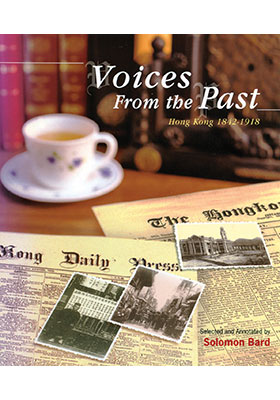Voices from the Past
Hong Kong 1842–1918
(香港1842–1918)
ISBN : 978-962-209-574-8
July 2002
390 pages, 7.5″ x 9″
- HK$250.00
Through excerpts from the earliest English language newspapers in Hong Kong, accompanied by Solomon Bard’s insightful comments, Voices From the Past provides unique glimpses into Hong Kong’s history. Richly illustrated with interesting photographs, chiefly from the Hong Kong Museum of History’s photographic library, the pages bring Hong Kong’s colonial past vividly to life.
The newspaper excerpts, in chronological order, are faithful to the original text, reproducing its quaint prose and spelling and even occasional errors. Focusing mainly on Hong Kong, the excerpts also touch on Macao, mainland China and the rest of the world. They reflect the changes over the years in language, style of writing, even in humour. Of special interest are the public’s responses to the many inventions which today we take for granted, such as electric lighting, the motor car, or the first attempts at flying. Most importantly, they reveal the gradual changes in Hong Kong’s colonial attitudes as these slowly adjust to the new contemporary values and social and political changes.
‘I was astonished at how different Hong Kong was a century ago, and I really enjoyed this fascinating and beautifully produced book.’ —Nury Vittachi, author and columnist
‘A source book for readers to get a feel of the times. The extracts are from English language newspapers and hence reflect at times strong “colonial” attitudes, but the compiler in his comments balances this by providing a different view of the topic or situation.’ —Reverend Carl T. Smith, historian

